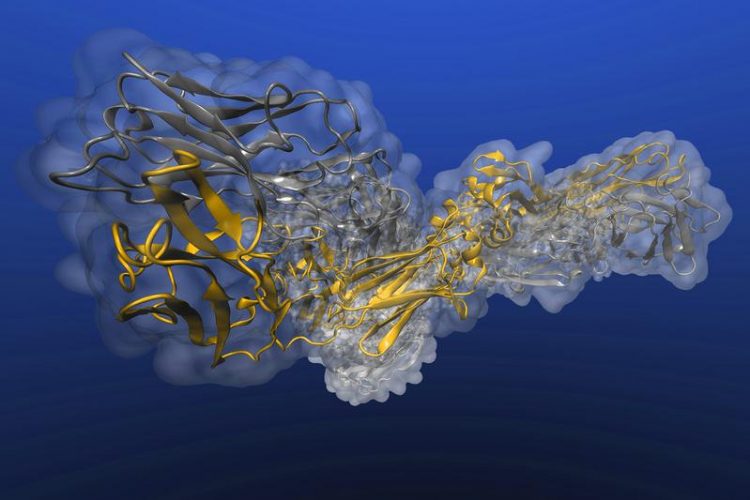Antiviral Antibodies

An example of an antibody (symbolic picture). Picture credits: Stefan Dübel/TU Braunschweig
The consortium “ATAC” (Antibody Therapy Against Coronavirus) will be financed by the European Union with about 3 Million euro. In total, the European Commission has allocated 47 Million euro to 136 laboratories in 17 teams for the development of vaccines, diagnostics and therapies for COVID-19.
Antibodies for therapy have been in use for 125 years, because in contrast to conventional vaccines, they can be also used for the treatment of patients that are already ill. Emil von Behring was the first to use this therapeutic approach against diphtheria, which yielded him the Nobel Prize for medicine in 1901.
From that date until today antisera from horses are still used for this type of therapy in most cases. In contrast, at TU Braunschweig, human antibodies will be generated with a technology called antibody phage display. This approach allows to generate human antibodies entirely in the test tube.
Because this method also provides the molecular blueprint of these antibodies right away, they can be produced in cell culture in unlimited amounts and very high quality. Professor Stefan Dübel, head of the department of Biotechnology, an inventor of this technology, Professor Michael Hust, the principle investigator of this project, and their team have many years of experience in the development of neutralizing antibodies against viruses like Marburg virus, Ebola and HIV.
The development of therapeutic antibodies against COVID-19 is expected to take several months to a year, in particular because of necessary efficacy and safety tests.
More information:
ATAC Consortium members are the Karolinska Institutet (Sweden, Qiang Pan-Hammarström and Lennart Hammarström, coordinators), the Institute for Research in Biomedicine (Switzerland, Luca Varani and Davide Robbiani), the Joint Research Centre- European Commission (Belgium, Luigi Calzolai), Policlinico San Matteo (Italy, Fausto Baldanti) and Technische Universität of Braunschweig (Germany, Michael Hust). The partners’ outstanding expertise is attested by high impact publications on antibody treatment for emerging infectious diseases.
Prof. Dr. Michael Hust
Technische Universität Braunschweig
Institute of Biochemistry, Biotechnology and Bioinformatics
Department of Biotechnology
Spielmannstraße 7
38106 Braunschweig
Germany
Phone: +49 531 391-5760
E-Mail: m.hust@tu-braunschweig.de
www.bbt.tu-bs.de/Biotech
https://magazin.tu-braunschweig.de/en/pi-post/antiviral-antibodies/
Media Contact
All latest news from the category: Life Sciences and Chemistry
Articles and reports from the Life Sciences and chemistry area deal with applied and basic research into modern biology, chemistry and human medicine.
Valuable information can be found on a range of life sciences fields including bacteriology, biochemistry, bionics, bioinformatics, biophysics, biotechnology, genetics, geobotany, human biology, marine biology, microbiology, molecular biology, cellular biology, zoology, bioinorganic chemistry, microchemistry and environmental chemistry.
Newest articles

New organoid with all key pancreas cells
Researchers from the Organoid group (previously Clevers group) at the Hubrecht Institute have developed a new organoid that mimics the human fetal pancreas, offering a clearer view of its early development….

Unlocking the potential of nickel
New study reveals how to use single atoms to turn CO2 into valuable chemical resources. Nickel and nitrogen co-doped carbon (Ni-N-C) catalysts have shown exceptional performance in converting CO2 into…

‘Spooky action’ at a very short distance
Scientists map out quantum entanglement in protons. Particles streaming from collisions offer insight into dynamic interactions and collective behavior of quarks and gluons. Scientists at the U.S. Department of Energy’s…



